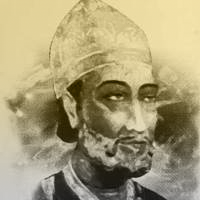Profile of Shah Naseer
Pen Name : 'Naseer'
Real Name : Naseeruddin
Born :Delhi
Relatives : Zainul Aabideen Aarif (Master), Daulat Singh (Master), Karamat Ali Shaheedi (Master), Maharaj Singh Aziz (Master), Dhoomi Lal Tarab (Master), Moti Lal Tarab (Master)
Born Muhammad Naseeruddin, he used to use the pseudonym Naseer. His nickname was Mia'n Kallu. At the beginning of the name, the word Shah refers to the lineage of Sadat and his close connection with Sufism. He was one of the descendants of Shah Sadr Jaha'n. After the death of his father, he became the Sajjada Nashin of Dargah. His father's name was Shah Gharibullah who was a respected and virtuous elder. The details of Shah Naseer's date of birth are not found in any of the chronicles of this period. Prof. Tanveer Ahmad Alvi suggests it is between 1756-1761. Shah Naseer was raised and educated in Delhi. His father paid close attention to his education. In the opinion of his contemporary commentators Hakim Qudratullah Qasim, Mushafi, and Tafta, he had no special interest in acquiring knowledge. These commentators have expressed skepticism about the reasons for this. Perhaps the result of his father's untimely death was that he did not get the opportunity to study and was deprived of education due to domestic responsibilities. Due to his poetic taste and imagination, Shah Naseer made a special place for himself among the connoisseurs of literature. Despite the fact that he did not receive the title of "Malikush-Shu'ara" from the court of Shah Alam, he became known as Malikush-Shu'ara. Twice a month he used to hold poetry gatherings at his residence in Delhi and was famous as the Ustad of his time. Munshi Raja Chandu Lal Khatri was a resident of Delhi but made Hyderabad his home. He was the same age as Shah Naseer. When they settled in Deccan, during the reign of Nawab Nasir-ul-Mulk, Shah Naseer was called to Deccan. Here he received the same honor and status as he did in Delhi. He became known as a respected and well-known personality of Hyderabad Deccan. He died in 1838 and was buried in the shrine of Musa Qazi. After the death of Shah Naseer, his first poetry collection in the form of 'Intikhab-e-Kulliyat-e-Shah Naseer' was published in the year 1878-79 with the efforts of Hafiz Muhammad Akbar from High Press Meerut. In addition, 'Chamanistan-e-Sukhan' was copied from the personal library of Ahmad Ali Khan Shaheed Dehlvi and published by Fakhr Nizami Hyderabad Press.

